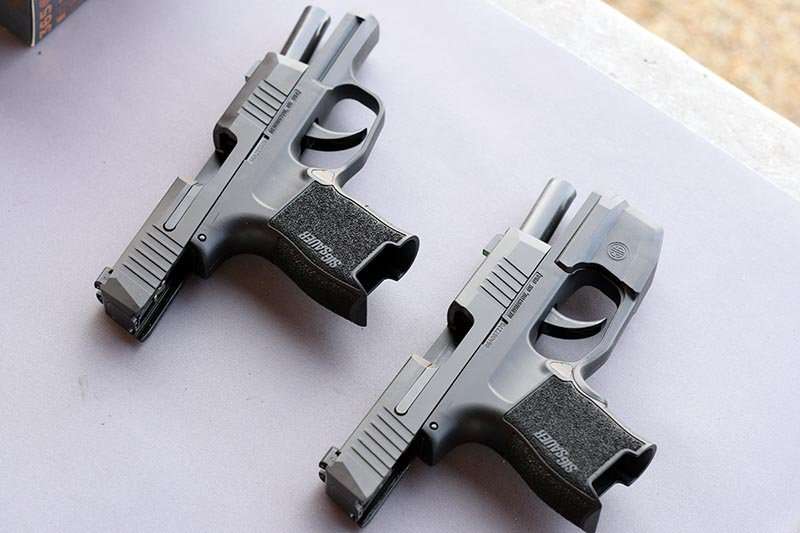
There are plenty of myths in the gun industry. Some of these can be dangerous, like “there’s no need to aim your shotgun.” Others are just idiotic.
We’ve covered some of these more dangerous myths in the past, like the more popular shotgun myths that are actually dangerous, when you click that link.
Now this time, we’ll cover the myth of handgun stopping power. Before we get there, let’s discuss the following:
What is stopping power?
Stopping power is the thought that a single bullet fired from the barrel of a handgun has the ability to stop an attacker from continuing on in his attack.
This is largely a myth for a few different reasons.
Handgun sacrifice:
The main reason to the myth of handgun stopping power is because carrying a handgun means that certain sacrifices need to be made, like the size of the gun and barrel.
You can really only carry so much gun on you before it becomes too big to carry concealed. Because guns with shorter barrels are usually not as effective at stopping an attack, this is a sacrifice.
You sacrifice a bigger, more effective gun so you can effectively conceal a smaller, less effective one.
The gun’s caliber does NOT matter at this point because nearly all handgun calibers are underpowered when compared to rifle calibers.
And even handgun calibers when fired from rifle platforms perform better than those fired from handguns.
But, there is an important distinction that needs to be made, and that is, we carry these small guns because they are concealable.
They are easier to carry than a long gun is, and handgun rounds are good-enough at stopping an attack as long as you do your part.
Handgun stopping power expanded:
Expanding upon the myth of stopping power even further, is that while “stopping power” should never be expected, it is something that can be achieved.
What I mean when I say this, is that any single bullet can in fact stop an attack from continuing on. The key is that it has to have proper placement to hit a part of the body that will incapacitate it.
So if a bullet hits an organ that the body needs in order to keep moving, then it will work to stop the threat.
This is all a big “if” however. In other words “if” you hit your target in that area, which is not an easy thing to do when you’re in the midst of being attacked and flight or fight has kicked in.
Your body’s response to stress matters:
Because your body goes through these changes, it makes it hard to do certain things. Here are just a few of the things that will happen to your body:
- Sweaty hands
- Loss of fine motor skills
- Tunnel Vision
- Increased heart rate
- Increased respirations
- Inability to make decisions
- Etc
Because of the above, and other things your body is going through, you’ll find it harder to hit center mass with your handgun.
This is one of the reasons why the pros say things like “muscle memory.” This muscle memory is only achievable with proper training, however. And proper training is something that should occur a lot.
When I say “a lot” I mean, you’re not training enough. It doesn’t matter who you are, unless you’re a pro shooter you’re not training enough. Neither am I.
Yes, ammo is expensive. Do dry fire training. Do repetitions of drawing your gun out of your holster and presenting to target from the comfort of your own home while your gun is empty.
Help build up that muscle memory however you can.
Caliber matters for stopping power:
… but not the way you might think.
Before I offend anyone, let me say that I always recommend that a person carries the best handgun caliber that they can effectively and accurately shoot.
Now that I’ve gotten that out of the way, let’s offend you.
You’ll often hear of people who say that they’d only carry a gun in a caliber that started in a “4” or something similar.
These folks are usually the ones who make the argument for stopping power, with the belief that they hold some magical key for stopping threats.
That doesn’t mean that they’re necessarily wrong, because usually the biggest caliber you can accurately and effectively shoot will end up being the best one for you defensively.
But shooting these bigger calibers, to a certain point and only for some people, usually comes at a cost.
The bigger calibers usually have more associated recoil in the guns that shoot them.
Because this is true, combined with the flight or fight responses listed above and the fact that we just determined that you’re not training enough, you’ll have a hard time landing accurate shots unless you’ve done a lot of stressful shooting.
This is just the way it is and it’s nearly impossible to make up for it. After all, you do lose control of motor function.
This is one of the main reasons why people choose to carry 9mm handguns. They recoil less, but have similar ballistics to the others. Check out my comparison articles:
Conclusion:
Please don’t misunderstand me, I’m not saying that 9mm is better at stopping an attack, though having multiple rounds of ammo could surely help if your shooting was not so accurate or you had more than one attacker.
At the end of the day, all I’m saying is that stopping power is a myth most of the time, though it can be achieved. AND you should choose the best gun in the best defensive cartridge that you can accurately shoot.

